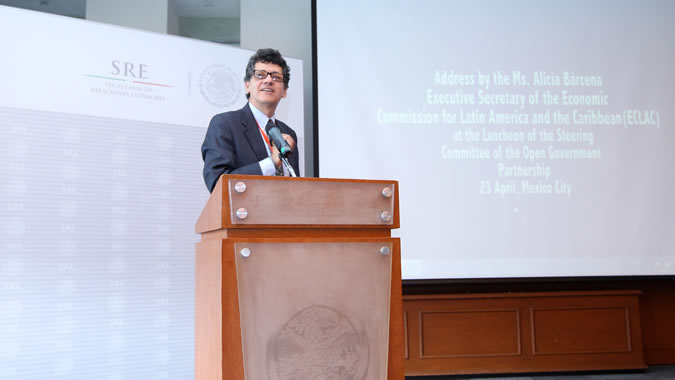ECLAC Offers Technical Assistance to 15 Countries from the Open Government Partnership
Work area(s)
Topic(s)
The regional organization also signed an accord with Mexico’s Presidency during a Ministerial Summit that was held from April 21-23.

The Economic Commission for Latin America and the Caribbean (ECLAC) will be able to give technical assistance to the 15 countries in the region that form part of the Open Government Partnership (OGP) thanks to a letter of understanding signed on April 23 in Mexico City during a Ministerial Summit organized by this platform.
The regional United Nations organization also signed an accord with the government of Mexico, represented on this occasion by Alejandra Lagunes, Coordinator of the Presidency’s National Digital Strategy, through which it will offer technical assistance to that country on matters of open government.
Mexico currently presides the OGP, which held this Summit from April 21-23 at the headquarters of that country’s Foreign Relations Secretariat.
ECLAC’s Executive Secretary, Alicia Bárcena, spoke to participants via a recorded message. She said that the world is undergoing a data revolution that implies a paradigm shift on a global level, is redefining the balance of power between various social actors, and will be a key tool for the new post-2015 development agenda that will be adopted this year.
“The region needs a new State-market-society configuration that includes empowering the people’s role in this equation. Through this conceptual framework we understand the protagonism of the pillars of open government: transparency, collaboration within government, citizen participation and technological innovation through open data,” she emphasized.
The Director of the Latin American and Caribbean Institute for Economic and Social Planning (ILPES), Jorge Máttar, represented ECLAC at the meeting. He explained that this organization has developed numerous initiatives to promote the policies of open government in Latin America and the Caribbean through a series of projects in terms of training and the publication of studies, as well as technical assistance, as in the case of Chile.
The letter of understanding signed with the Partnership will allow both sides to explore cooperation in areas such as improving public services, the efficient management of public resources, corporate responsibility, or the exchange of information and dissemination of knowledge.
The Open Government Partnership is a multilateral, volunteer initiative that was launched in September 2011 during the sixty-sixth session of the United Nations General Assembly. It currently groups 65 participating countries.
This platform aims for governments to work together with local civil society to develop and implement national action plans for open government that include commitments to promoting transparency, empowering citizens, combating corruption and harnessing new technologies to strengthen governance.
The 15 countries of Latin America and the Caribbean participating in this Partnership are Argentina, Brazil, Chile, Colombia, Costa Rica, the Dominican Republic, El Salvador, Guatemala, Honduras, Mexico, Panama, Paraguay, Peru, Trinidad and Tobago and Uruguay.
Country(ies)
- Latin America and the Caribbean
-
Mexico
Contact
Public Information Unit
- prensa@cepal.org
- (56 2) 2210 2040